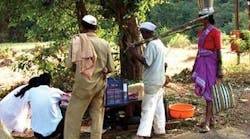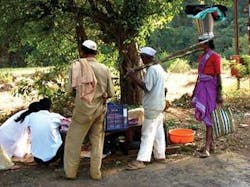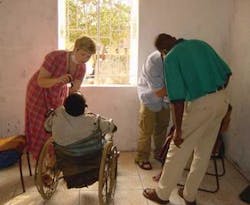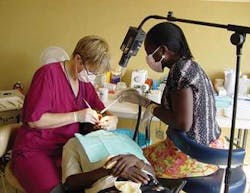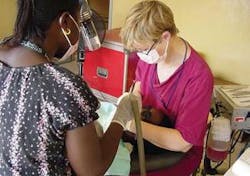A hygienist and her husband volunteer with Mercy Ships, a nondenominational organization that brings desperately needed medical and dental services to people in the underdeveloped part of the world.
Robbie Lerma, RDH, lives a comfortable life in Alabama. The 1981 graduate of the University of Texas dental hygiene program began her relationship with dentistry her senior year of high school as a dental assistant for her family's dentist. She now practices as a fill-in a couple of days a week and is a Mary Kay cosmetics consultant who "is working on earning the pink car."
What distinguishes Robbie from her peers, however, is her work for the last 10 years as a dedicated volunteer with Mercy Ships, a nondemoninational organization that brings desperately needed medical and dental services to people in the underdeveloped part of the world.
In 1989, her husband, Steve, a nurse anesthetist and Army veteran who served in Desert Storm, was looking for a way to use his medical skills as a volunteer when he saw a newspaper ad seeking health-care volunteers for short-term assignments in poorly served countries. He and Robbie served two weeks in the Dominican Republic with Mercy Ships, with an experience so rewarding that it changed not only his life, but Robbie's as well.
However, family responsibilities prevented Robbie from joining Steve on the ship until 1997. That year, the couple traveled to South Africa where they served on the ship for four weeks. Initially, leaving her three children with family and friends, she and her husband would serve for three to four weeks. Eventually, as their children grew up and went out on their own, Steve and Robbie both felt a calling to spend more time volunteering with Mercy Ships. They both quit their jobs in Chattanooga, Tenn., and moved to Hamilton, Ala., where Steve found a position where he could work nine months a year, giving him the time to spend three months volunteering with Mercy Ships. Robbie also now had her time freed up as she was now doing relief work in Alabama.
Mercy Ships, based in Garden Valley, Texas, has volunteers from more than 30 countries — primarily from England, France, Denmark, Australia, South Africa, and other European countries. In addition, there are volunteers from some of the African nations. About one-third of the volunteers on the ship also come from the United States.
An advance team contacts the government of a needy country and explains what the volunteers are able to do. After this the country will extend an invitation to the ship to come to their country. In exchange for providing free health care, the host country waives port fees and supplies water which the ship purifies with its on-board purification system.
Steve and Robbie normally spend January, February, and March on the ship. Currently the ship in use by the ministry is called the "Africa Mercy," and it is the largest nongovernment hospital ship in the world. It has six operating rooms for surgeries and an 80-bed ward. The couple always flies to the country they will be serving and meets the ship, which is already onsite. Robbie starts her day around 8:30 and sees six to eight patients a day. The weather is very hot and humid, and there is no air conditioning at the dental clinic. She said she usually feels ill the first couple of days but then is able to acclimate to the weather conditions. About half of her expenses are paid by gifts from friends, and her church usually takes up a love offering for her. The rest of the funds come from the couple themselves. She does her laundry once a week on board ship, but the hospital launders her scrubs. She and Steve live in a small cabin on the ship and have most of their meals on board. During the last couple of years, Robbie has been eating more African food, especially fish, rice, and cassava, cooked by locals who have been supplied with staples by Mercy Ships. Weekends are usually spent resting up from the week and occasionally doing things like visiting an orphanage or going into town for a meal at a local restaurant.
Robbie explains that the dental work she does is not performed on the ship. She said, "Wherever the ship is docked, we set up a clinic in a building in the town. The clinic usually has up to five dental chairs, and we use portable generators and compressors."
Several months before the ship is scheduled to arrive, an advance team makes arrangements with local churches so they can do screenings for people who need surgery and dental work. She said, "Radio announcements are aired to let people know that the Mercy Ship is coming. When the ship arrives, we find long lines of people waiting for care. We see as many people as we can, depending on the number of staff, and those not seen will often return the next day or until they can be seen. The word really gets out quickly."
Most of Robbie's patients have never had dental care so many are initially wary. Robbie said, "We comfort them and reassure them that everything will be OK since they've never had their teeth cleaned before. Some may have had extractions — without an anesthetic! Many people have a lot of stain from cola nuts, and in the sugar cane-growing areas the kids have many cavities. If they don't eat a lot of sugar, we don't see much decay. I also see a lot of calculus, especially in patients with a soft diet high in rice because then the teeth aren't being cleaned naturally. Sometimes the teeth are completely covered in calculus and I can't even see them! Ultrasonic scaling is the rule rather than the exception in these countries. For the most part, the people in these countries are very patient, even the kids. They can see a big difference in their gingiva after the irritants are removed."
One year, Robbie applied sealants on about 100 children in a Sierra Leone orphanage.
To say the people are appreciative would be an understatement. Robbie recalls one man who, upon seeing his newly cleaned teeth in the mirror, jumped up, started dancing, and said, "Now my wife will kiss me again." Patients have brought gifts like pineapples and one man, a tailor, made her a dress.
The staff always works with a translator, even if English is spoken in that country. English in these countries seems like a foreign language because of accents and idioms. Robbie explained that "lots of education is provided while the patients wait to be seen." She and the translator will teach proper brushing and flossing techniques and give general nutrition advice. Everyone who comes to the clinic receives a toothbrush, toothpaste, and floss. All these items have been donated by the time the outreach begins.
Robbie has been to Sierra Leone three times as well as to Togo, Benin, Guinea, South Africa, and Liberia. She said, "Africa was the last place I wanted to go, but now it is my first choice. I've fallen in love with the people."
The cultural and lifestyle adjustments she needs to make on these journeys make her appreciate her life in Alabama. For example, she said, "Women in these countries are not treated well by men. They have many children yet the marriage rate is low. Women also do most of the work. It's common to see a man walking in front of a woman who is carrying everything. Robbie says that she wants to see women treated better and feel better about themselves, and for them to see themselves the way God sees them.
She said, "The first time I visited Africa, I cried a lot the whole first week because the things I saw were so shocking. I remember seeing a pregnant woman who needed a C-section, but because she didn't have any money to pay for one she was left to die in the clinic. Many of the things I saw are too awful to think about. When I return to the United States after one of these outreaches, I experience almost a reverse culture shock. I've seen patients who have lived with a tooth infection for a year compared with here where people want immediate care even if they have just a little pain. I look at how much stuff I have and realize how much I sometimes take my lifestyle for granted without appreciating how blessed I am."
Robbie welcomes inquiries from dental hygienists who would like more information about volunteering with Mercy Ships. She can be reached by e-mail at: [email protected].
About the Author
Judith E. Sulik, RDH, MBA, is president of Finally Finished Press of Middleton, Wis. She recently published a cookbook based on Madison, Wisconsin-area restaurants. For details, contact her by e-mail at [email protected].
